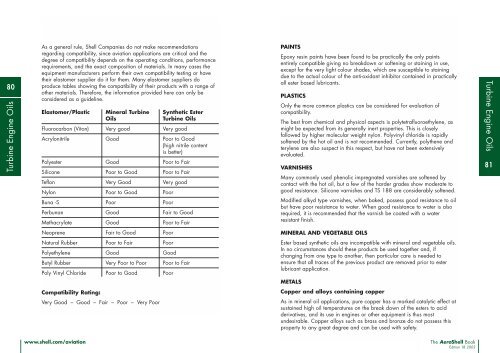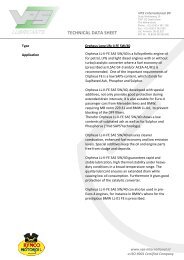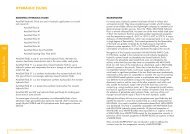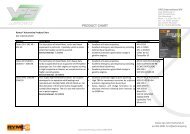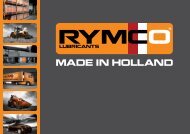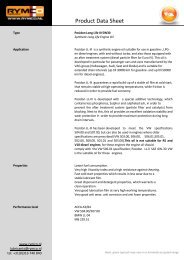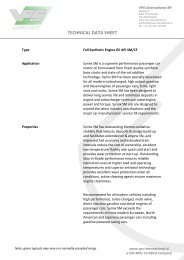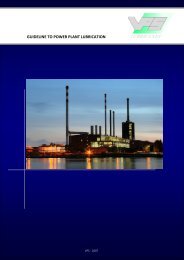Turbine Engine Oils - VPS Lubricants
Turbine Engine Oils - VPS Lubricants
Turbine Engine Oils - VPS Lubricants
Create successful ePaper yourself
Turn your PDF publications into a flip-book with our unique Google optimized e-Paper software.
80<strong>Turbine</strong> <strong>Engine</strong> <strong>Oils</strong>As a general rule, Shell Companies do not make recommendationsregarding compatibility, since aviation applications are critical and thedegree of compatibility depends on the operating conditions, performancerequirements, and the exact composition of materials. In many cases theequipment manufacturers perform their own compatibility testing or havetheir elastomer supplier do it for them. Many elastomer suppliers doproduce tables showing the compatibility of their products with a range ofother materials. Therefore, the information provided here can only beconsidered as a guideline.Elastomer/Plastic Mineral <strong>Turbine</strong> Synthetic Ester<strong>Oils</strong><strong>Turbine</strong> <strong>Oils</strong>Fluorocarbon (Viton) Very good Very goodAcrylonitrile Good Poor to Good(high nitrile contentis better)Polyester Good Poor to FairSilicone Poor to Good Poor to FairTeflon Very Good Very goodNylon Poor to Good PoorBuna -S Poor PoorPerbunan Good Fair to GoodMethacrylate Good Poor to FairPAINTSEpoxy resin paints have been found to be practically the only paintsentirely compatible giving no breakdown or softening or staining in use,except for the very light colour shades, which are susceptible to stainingdue to the actual colour of the anti-oxidant inhibitor contained in practicallyall ester based lubricants.PLASTICSOnly the more common plastics can be considered for evaluation ofcompatibility.The best from chemical and physical aspects is polytetrafluoroethylene, asmight be expected from its generally inert properties. This is closelyfollowed by higher molecular weight nylon. Polyvinyl chloride is rapidlysoftened by the hot oil and is not recommended. Currently, polythene andterylene are also suspect in this respect, but have not been extensivelyevaluated.VARNISHESMany commonly used phenolic impregnated varnishes are softened bycontact with the hot oil, but a few of the harder grades show moderate togood resistance. Silicone varnishes and TS 188 are considerably softened.Modified alkyd type varnishes, when baked, possess good resistance to oilbut have poor resistance to water. When good resistance to water is alsorequired, it is recommended that the varnish be coated with a waterresistant finish.<strong>Turbine</strong> <strong>Engine</strong> <strong>Oils</strong>81Neoprene Fair to Good PoorMINERAL AND VEGETABLE OILSEster based synthetic oils are incompatible with mineral and vegetable oils.In no circumstances should these products be used together and, ifchanging from one type to another, then particular care is needed toensure that all traces of the previous product are removed prior to esterlubricant application.Natural Rubber Poor to Fair PoorPolyethylene Good GoodButyl Rubber Very Poor to Poor Poor to FairPoly Vinyl Chloride Poor to Good PoorMETALSCopper and alloys containing copperAs in mineral oil applications, pure copper has a marked catalytic effect atsustained high oil temperatures on the break down of the esters to acidderivatives, and its use in engines or other equipment is thus mostundesirable. Copper alloys such as brass and bronze do not possess thisproperty to any great degree and can be used with safety.Compatibility Rating:Very Good – Good – Fair – Poor – Very Poorwww.shell.com/aviationThe AeroShell BookEdition 18 2003


